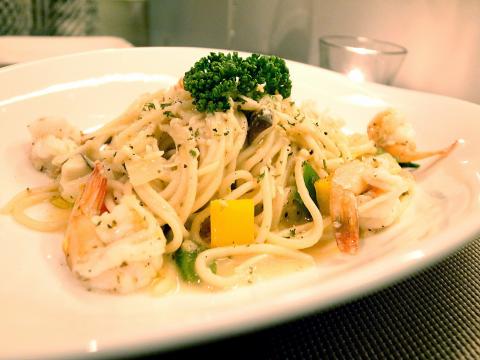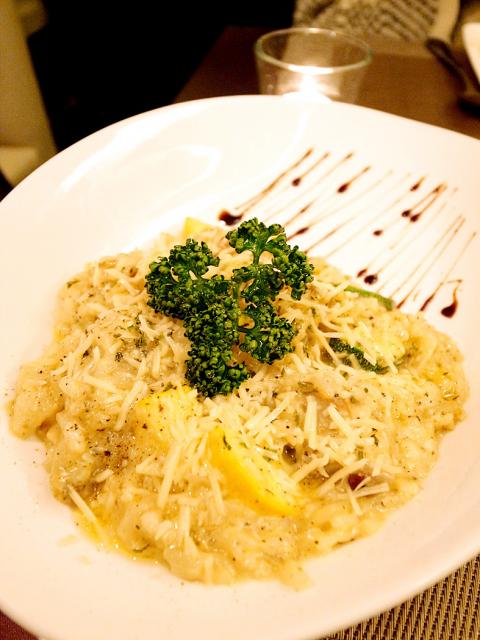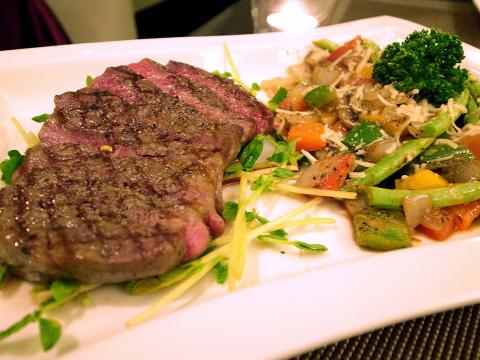Experiencing a city on a weekend or over a lifetime inevitably spells great differences. For long-time residents of Taipei, life doesn’t only involve going to Taipei 101 or dining at Din Tai Fung (鼎泰豐). At first glance, Merlot Cafe & Bistro is one of such places that can simply fall off the radar — or never appear in the first place. Ranked No. 1 on TripAdvisor among 8,865 restaurants in Taipei, the intimate bistro is a well-guarded secret among foreign visitors to the city, with relatively little coverage from local food bloggers and journalists. But a closer look reveals something that we all look for in a place to eat, drink and be merry: quality food and a friendly host who knows his customers by their first-names.
Small, homey and hidden away in a back alley off the bustling Linsen North Road (林森北路), the establishment appears modest compared to its reputation. The interior is neat, clean and, with a capacity of merely 20 dinners, can get crowded when the restaurant is full. Often, the smell of food being prepared wafts up from the open kitchen, while Bob Chau, the gracious host and an ABT (American-born Taiwanese) from California, glides between tightly packed tables, chatting with patrons about everything from food to life.
Much like the cordial service, Chau’s cooking is also a hearty fare. For appetizers, choices include the baked mozzarella (NT$280) and Merlot’s special salsa and tuna (NT$250) which is composed of salsa, creamy tuna fish and parmesan cheese with extra virgin olive oil drizzled on top. Both are served with toasted Ciabatta bread. The popular Italian style antipasto salad (NT$490) appeals to lighter appetites with a medley of salami, fresh tomatoes, basil, cucumbers, alfalfa sprouts and Parmesan cheese.

Photo: Ho Yi, Taipei Times
Featuring handmade pastas, Merlot’s kitchen offers a satisfying selection of the Italian staple. The shrimp and vegetable spaghetti (NT$300) I tried impressed with the substantial texture of the pasta cooked al dente and paired well with shrimps sauteed in white wine and with garlic, onions, bell peppers, mushrooms and basil. For a richer taste, old-school spaghetti Bolognese (NT$290) and spaghetti carbonara (NT$260) are on offer.
Another Merlot specialty is risotto, which is cooked to a creamy consistency. Chau’s rendition of the rice dish is comfortingly soft and smooth. The chicken and zucchini risotto (NT$350), for example, tasted like a piece of creamy heaven with small chunks of chicken melting instantly on the tongue. It was a soul-comforting stodge made for big appetites.
Equally filling choices are the chargrilled lamb chops (NT$590) with creamy three cheese and mushroom risotto, the grilled steak and vegetable risotto (NT$410) and the seared scallop and shrimp risotto (NT$570).

Photo: Ho Yi, Taipei Times
Determined to try out the bistro’s much lauded steak, my dining partner and I ran the risk of committing the sin of gluttony and ordered the chargrilled steak (8oz, NT$490) with sauteed seasonal vegetables. Cooked medium-rare to medium and sliced thin, the simply seasoned beef was as tender and juicy as a good piece of meat should be. And it also went well with my glass of Merlot (NT$240).
Speaking of wine, Merlot’s wine cellar contains a decent, wallet-friendly selection of whites and reds from Chile, Argentina, Germany, France, Italy, New Zealand and the US (NT$850 to NT$1,600 per bottle). There are also a few choices of sparkling wine from Germany (NT$180 per glass and NT$990 per bottle) as well as a variety of cocktails (NT$220 and NT$280) and beers (NT$100 to NT$150). For the wine illiterate, Chau doubles as the dependable sommelier, making food pairing recommendations for guests.
Offering good, hearty food, intimate service and a lovable host, Merlot Cafe & Bistro definitely draws people back, whether locals or travelers, again and again.

Photo: Ho Yi, Taipei Times

William Liu (劉家君) moved to Kaohsiung from Nantou to live with his boyfriend Reg Hong (洪嘉佑). “In Nantou, people do not support gay rights at all and never even talk about it. Living here made me optimistic and made me realize how much I can express myself,” Liu tells the Taipei Times. Hong and his friend Cony Hsieh (謝昀希) are both active in several LGBT groups and organizations in Kaohsiung. They were among the people behind the city’s 16th Pride event in November last year, which gathered over 35,000 people. Along with others, they clearly see Kaohsiung as the nexus of LGBT rights.

Jan. 26 to Feb. 1 Nearly 90 years after it was last recorded, the Basay language was taught in a classroom for the first time in September last year. Over the following three months, students learned its sounds along with the customs and folktales of the Ketagalan people, who once spoke it across northern Taiwan. Although each Ketagalan settlement had its own language, Basay functioned as a common trade language. By the late 19th century, it had largely fallen out of daily use as speakers shifted to Hoklo (commonly known as Taiwanese), surviving only in fragments remembered by the elderly. In

Dissident artist Ai Weiwei’s (艾未未) famous return to the People’s Republic of China (PRC) has been overshadowed by the astonishing news of the latest arrests of senior military figures for “corruption,” but it is an interesting piece of news in its own right, though more for what Ai does not understand than for what he does. Ai simply lacks the reflective understanding that the loneliness and isolation he imagines are “European” are simply the joys of life as an expat. That goes both ways: “I love Taiwan!” say many still wet-behind-the-ears expats here, not realizing what they love is being an

In the American west, “it is said, water flows upwards towards money,” wrote Marc Reisner in one of the most compelling books on public policy ever written, Cadillac Desert. As Americans failed to overcome the West’s water scarcity with hard work and private capital, the Federal government came to the rescue. As Reisner describes: “the American West quietly became the first and most durable example of the modern welfare state.” In Taiwan, the money toward which water flows upwards is the high tech industry, particularly the chip powerhouse Taiwan Semiconductor Manufacturing Co (TSMC, 台積電). Typically articles on TSMC’s water demand